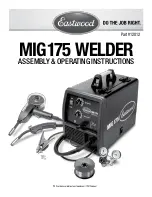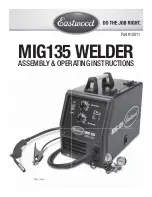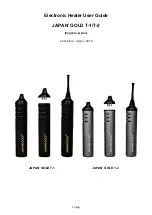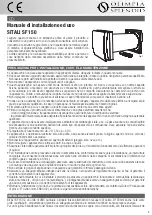
OperatiOn
4-24
powermax
65/85
Service Manual
Common machine-cutting faults
The torch’s pilot arc will initiate, but will not transfer. Causes can be:
• The work cable is not making good contact with the cutting table or the cutting table is not making good
contact with the workpiece.
• The torch-to-work distance is too large.
The workpiece is not totally penetrated, and there is excessive sparking on the top of the workpiece. Causes can be:
• The consumables are worn and need to be replaced. For optimized performance in a mechanized application,
replace the nozzle and the electrode together.
• The work cable is not making good contact with the cutting table or the cutting table is not making good
contact with the workpiece.
• The current (amperage) is set too low. See Section 3,
Torch Setup
for more information.
• The cut speed is too high. See the cut charts in Section 3,
Torch Setup,
for more information.
• The metal being cut exceeds the maximum capacity for the selected amperage. See Section 1,
Specifications
.
Dross forms on the bottom of the cut. Causes can be:
• The consumables are worn and need to be replaced. For optimized performance in a mechanized application,
replace the nozzle and the electrode together.
• The cutting speed is not correct. Refer to the cut charts in Section 3,
Torch Setup,
for more information.
• The current (amperage) is set too low. Refer to the cut charts in Section 3,
Torch Setup,
for more information.
The cut angle is not square. Causes can be:
• The consumables are worn and need to be replaced. For optimized performance in a mechanized application,
replace the nozzle and the electrode together.
• The direction of the torch travel is incorrect. The high-quality cut is always on the right with respect to the
forward motion of the torch.
• The distance between the torch and the workpiece is not correct.
• The cutting speed is not correct. Refer to the cut charts in Section 3,
Torch Setup,
for more information.
The consumables’ life is shortened. Causes can be:
• The arc current, arc voltage, travel speed, and other variables are not set as recommended in the cut charts.
• Firing the arc in the air (beginning or ending the cut off of the plate surface). Starting at the edge is acceptable
as long as the arc makes contact with the workpiece when started.
• Starting a pierce with an incorrect torch height.
Refer to the cut charts for the specific initial pierce height.
Summary of Contents for Powermax 65
Page 1: ...Service Manual 807120 Revision 1 Plasma arc cutting systems ...
Page 10: ...vi powermax65 85 Service Manual ...
Page 16: ...Table of Contents xii powermax65 85 Service Manual ...
Page 32: ...Specifications 1 16 powermax65 85 Service Manual ...
Page 182: ...Troubleshooting and System Tests 5 56 powermax65 85 Service Manual ...
Page 216: ...Component Replacement 6 34 powermax65 85 Service Manual ...
Page 244: ...Wiring Diagrams 8 2 powermax65 85 Service Manual ...
















































